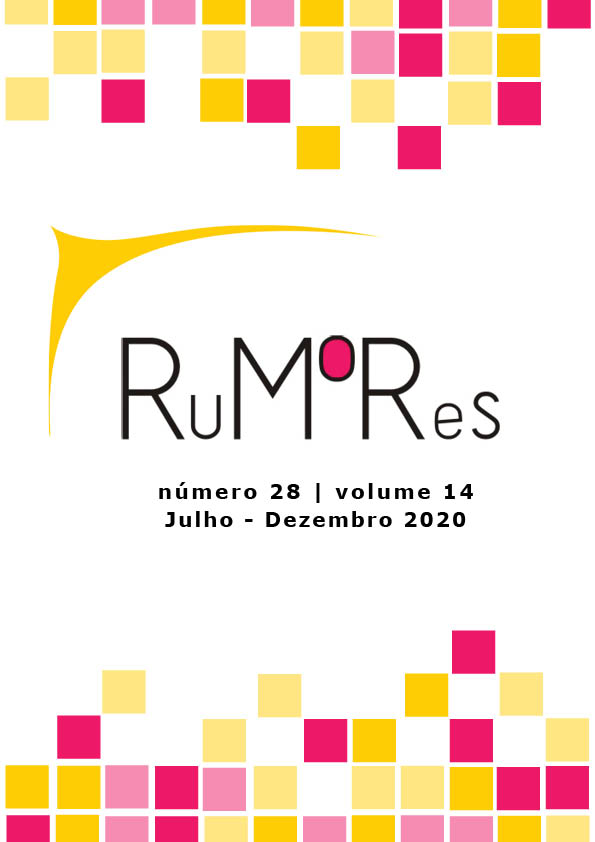Queer as a Zombie: metaphorizations of homophobia in television fiction
DOI:
https://doi.org/10.11606/issn.1982-677X.rum.2020.174440Keywords:
Zombie Studies, TV series, Metaphor, Sentimentalization, ZombiesAbstract
More than simply presenting an eery and lurid image, the figure of the undead brings the possibility of multiple metaphorical readings about what these beings can talk about our society and our most diverse dilemmas. Thus, the main purpose of this article is to discuss how the British series In the flesh metaphorizes homophobia based on gender and sexuality issues through the affective relationships of zombie and gay characters in the plot. The methodology is based on the study of discursive metaphorization and, in an intrinsic way, it uses the concept of discursive isotopy as the predominant operator of analysis. Finally, the conclusions point out that this TV series reveals examples of discursive metaphorizations based on family homophobia, clinical homophobia, religious homophobia, institutionally persecutory homophobia, and internalized homophobia.
Downloads
References
AIOSSA, E. The Subversive Zombie: Social Protest and Gender in Undead Cinema and Television. Jefferson: McFarland and Company, 2018.
ALLEN, R. H. The Classical Origins of Modern Homophobia. Jefferson: McFarland, 2006.
AKOTIRENE, C. Interseccionalidade. São Paulo: Sueli Carneiro; Pólen, 2019.
BISHOP, K. W. How Zombies Conquered Popular Culture: The Multifarious Walking Dead in the 21st Century. Jefferson: McFarland & Company, 2015.
BORRILLO, D. Homofobia: história e crítica de um preconceito. Belo Horizonte: Autêntica, 2010.
BUTLER, J. Problemas de gênero: feminismo e subversão da identidade. Rio deJaneiro, Civilização Brasileira, 2003.
CLOUGH, P. T. Introduction. In: CLOUGH, P. T.; CLOUGH, J. H. (orgs.). The Affective Turn: Theorizing the Social. Durham: Duke University Press, 2007.
COSTA, A. B.; NARDI, H. C. Homofobia e preconceito contra diversidade sexual: debate conceitual. Temas em Psicologia, v. 23, n. 3. Disponível em: http://dx.doi.org/10.9788/TP2015.3-15. Acesso em: 12 mar. 2020.
COUTINHO, R. S. Signos linguísticos e imagéticos da intolerância nos zumbis da série In the flesh. Tese (Doutorado). Universidade Federal de Goiás, 2016.
DENDLE, P. The zombie movie encyclopedia. Jefferson: McFarland & Co., 2001.
GARCÍA MARTÍNEZ, A. N.; GONZÁLEZ, A. M. Emotional Culture and TV Narratives. In: GARCÍA MARTÍNEZ, A. N. (org.). Emotions in Contemporary TV Series. New York: Palgrave Macmillan, 2016.
GARCÍA MARTÍNEZ, A. N. Prozac para zombis: La sentimentalización contemporánea del muerto viviente en la televisión. Brumal, v. IV, n. 1, primavera 2016.
HANDERSON, J. Vodu no Haiti – Candomblé no Brasil: identidades culturais e sistemas religiosos como concepções de mundo Afro-Latino-Americano. Dissertação (Mestrado). Universidade Federal de Pelotas, 2010.
HURSTON, Z. N. Tell My Horse: Voodoo and Life in Haiti and Jamaica. New York: Harper Collins, 1938.
JUNQUEIRA, R. D. Homofobia: limites e possibilidades de um conceito em disputa. Bagoas – estudos gays: gênero e sexualidades, v. 1, n. 1, jul.-dez. 2007. Disponível em: https://periodicos.ufrn.br/bagoas/issue/view/187. Acesso em: 23 abr. 2020.
KRISTEVA, J. Powers of horror: an essay of abjection. Nova York: Columbia University Press, 1985.
LEITE. R. L. Metaforização textual: a construção discursiva do sentido metafórico no texto. Tese (Doutorado). Universidade Federal do Ceará, 2007.
LEITE, R. L. Cognição e metaforização textual. In: MACEDO, A. C. P.; FELTES; Heloísa. P. M.; FARIAS, E. M. P. (orgs.). Cognição e lingüística: explorando territórios, mapeamentos e percursos. Caxias do Sul/Porto Alegre: Educs/Edipucrs, 2008.
LEITE, R. L. Isotopia e metaforização textual. Gragoatá, v. 14, n. 26, 1º sem. 2009.
LOURO, G. L. Gênero, sexualidade e educação: uma perspectiva pós-estruturalista. Petrópolis: Vozes, 1997.
McDANIEL, J. You Can Point a Finger at a Zombie. Sometimes They Fall Off: Contemporary Zombie Films, Embedded Ableism, and Disability as Metaphor. The Midwest Quarterly, v. 57, n. 4, 2016.
McGLOTTEN, S.; JONES, S. Zombies and Sexuality: Essays on Desire and the Living Dead. Jefferson: McFarland and Company, 2014.
MONTES, A. De los cuerpos travestis a los cuerpos zombis: la carne como figura de la historia. Buenos Aires: Argus-a, 2017.
REIS FILHO, L.; SUPPIA, A. Dos cânones sagrados às alegorias profanas: a laicização do Zumbi no cinema. Mneme, v. 12, n. 29, jul. 2011. Disponível em: https://periodicos.ufrn.br/mneme/article/view/1013. Acesso em: 31 maio 2020.
SILVA, A. L.; GARCÍA MARTINEZ, A. N. Um espectador-pesquisador: Alberto Nahum García Martínez e o estudo acadêmico sobre séries televisivas na Espanha (Entrevista). Ação Midiática, n. 13, jan.-jun. 2017. Disponível em: http://encurtador.com.br/ADI46. Acesso em: 23 abr. 2020.
SUPPIA, A.; REIS FILHO, L. Marharhahar Z!namabarn: Breve panorama do cinema de zumbi na América Latina. Revista Rumores, v. 7, n. 13, jul. 2013. Disponível em: http://migre.me/w3NVy. Acesso em: 11 mar. 2020.
SZANTER, A.; RICHARDS, J. K. Romancing the Zombie: Essays on the Undead as Significant “Other”. Jefferson: McFarland and Company, 2017.
VERVAEKE, J.; MASTROPIETRO, C.; MISCEVIC, F. Zombies in Western Culture: A Twenty-First Century Crisis. Cambridge: Open Books Publishers, 2017.
WRIGHT, K. Disgust and desire: the paradox of the monster. Amsterdam: Brill/Rodopi, 2018.
Downloads
Published
Issue
Section
License
Copyright (c) 2021 Anderson Lopes da Silva

This work is licensed under a Creative Commons Attribution-NonCommercial-ShareAlike 4.0 International License.
Declaro a total e irrestrita cessão de direitos autorais sobre o texto enviado para publicação na Rumores – Revista Online de Comunicação, Linguagem e Mídias. Entendo que o conteúdo do artigo é de minha inteira responsabilidade, inclusive cabendo a mim a apresentação de permissão para uso de imagens, ilustrações, tabelas, gráficos de terceiros que, porventura, venham a integrá-lo.









